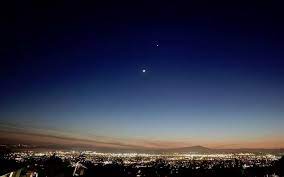
There is, hidden away in the Book of Revelation, a very tiny but precious verse. In each of the highly-stylized and structured messages to the seven churches of Asia that Christ passes along to John, Christ makes promises to those who will overcome and persevere during the coming time of trial and persecution. To those in the church of Thyatira, He promises that He will give authority over the nations just as He Himself received authority from the Father. Then He adds, “and I will give him the morning star” (Revelation 2:27-28).
None of the promises made to those in the seven churches of Asia are exclusive to them; all who overcome will have such gifts, whether they belong to the church in Thyatira, Ephesus, New York, London, or Langley. The question here is: what is meant by “the morning star”? There are, I discovered, a surprising number of answers offered by commentators.
One commentator suggested that because Isaiah 14:12 refers to the fall from heaven of Lucifer (thus the KJV, from the word Latin for “light-bearer”; the Hebrew is heylel, “the shining one”), and because this person also described as the “son of the morning”, Christ here offers us—well, Lucifer. Never mind that the Isaiah passage originally referred not to an fallen angel named Lucifer, but to the death of the king of Babylon (hence the reference in verse 11 to maggots spread out under him as his bed). The reference to “Lucifer” as the “shining one, the “son of the morning” was enough. Presumably the commentator meant we are given the gift of Lucifer in the sense of given power over Lucifer, but this would be a distinctly odd way of saying it. And given that Christ Himself is later called “the morning star” in Revelation 22:16, the use of the same title for devil seems to be ruled out.
Another commentator opined that it referred to the final resurrection, the dawn of eternal life coming like the morning star after the long night of death. But, once again, why not simply say that we will be given eternal life? Such eternal life is referred to without any ambiguity in Revelation 2:10, which speaks of the gift of the crown of life. Why refer to something so obvious with such ambiguity?
Another commentator suggested that this was a literal reference to the planet Venus, usually called “the morning star”. But what would we do with a planet? Especially a planet jointly owned by all the saved? Use it as a community garden?
Yet another commentator remembered Numbers 24:17, a prophecy of Balaam which spoke of “a star coming forth from Jacob, and a scepter rising from Israel”—i.e. Israel’s military might, that opined that the morning star meant a gift of authority. But then why speak of “the morning star” (Greek ἀστέρα τὸν πρωϊνόν/ astera ton proinon)—i.e. the planet Venus, popularly called “the morning star” because it was seen in the east before the sunrise? The emphasis of this verse in Revelation is on the morning star, not just any old star, and the Numbers passage makes no reference to a morning star.
Because Christ is referred to in Revelation 22:16 as the morning star, some suggest, with greater plausibility, that it refers to Christ. This would be more credible if the Christological reference preceded this promise, allowing the readers to who knew that Christ was the morning star to read that meaning into this promise. But the Christological reference doesn’t precede it, and readers would be unlikely to guess it referred to Christ on their own. Besides, if Christ simply meant, “I will give Myself to you”, why didn’t He just say it?
I suggest that instead of mining the Scriptures for references to stars and morning stars we turn to the human heart and human experience. That of seeing the morning star was a universal experience, one that filled the heart with hope. The morning star, shining in the darkness, was a promise of joy, of light, of a fresh morning, a new day.
It is this universal experience, rather than any Biblical text, that undergirds this verse. Christ promises us all that our experience of the morning star embodies—beauty, light, hope, freshness, joy. Indeed, Jesus Himself embodies all these qualities (hence His self-identification with the morning star in Revelation 22:16), and as a part of our salvation, glorification, and final theosis, He promises them to us all.
This satisfies one of our deepest longings. All around us we see the glories of nature—the freshness of the new day, the strength of the mountains, the bracing vigour of the wind, the transcendent radiance of the stars illumining the night sky, the fragile beauty of the flowers—and the solitary splendour of the morning star, ravishing the heart and promising light and life. All these glories beguile us, enchant us, but the sight of them leaves us unfulfilled and unchanged. In the words of one writer, “At present we are on the outside of the world, the wrong side of the door. We discern the freshness and purity of morning, but they do not make us fresh and pure. We cannot mingle with the splendours we see.”
But one day we shall. The freshness and purity, the strength and vigour, the radiance and beauty—all those glories will be ours. Our hearts will not always remain stained, tainted, broken, and sinful. A healing and transformation will finally come. Now we can only look up and see Venus, a beauty shining in the heavens. One day this beauty will be ours. Christ will give us the morning star.
